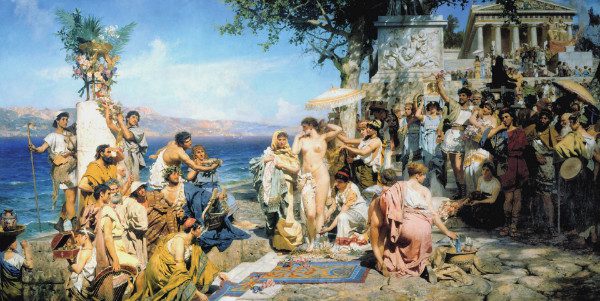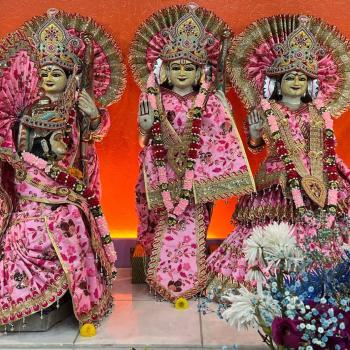Does faith prevent or propagate intolerance, and should someone have the right to deny the veracity and historicity of your faith tradition?
The above is a question currently being asked at Patheos, and it’s a tricky one to answer. Faith makes some people better, and it turns others into awful people. The “origin stories” so central to most faiths are also a matter of belief and not history. Denying something that there’s no proof for is not the same as denying an actual, verifiable historical event.

Faith & Intolerance
I don’t think faith necessarily promotes intolerance, but I believe that absolutes do, and some faith traditions do deal in absolutes. I think monotheistic traditions deal with the largest absolutes (“one deity”, “one way”, etc.) which is probably why many monotheistic faiths tend to not play well with others. To some extent I understand it. If someone believes their deity is the only deity, and the only way to worship that deity was revealed X amount of centuries ago, there may not be a lot of wiggle room when it comes to accepting other traditions and ideas.
Not surprisingly, I find the belief in such absolutes limiting and insulting. It limits deity because it makes deity appear weak, ignorant, and without mercy or kindness. It’s weak because it can’t beat back the forces of evil/deception it created. It’s ignorant because it forgot half the world or more when it revealed its absolute, and it’s lacking in mercy because it condemns all sorts of people because its means of communication are so poor.
Let’s say you are a deity trying to spread your absolute message across the world in the year 200 CE, wouldn’t you try and spread it in a couple of places at once? Ever notice how no one in the Americas ever got to hear “the good news” for over a 1000 years?* That seems like quite the oversight for an omnipotent deity. “God so loved the world that he forgot about half of it” just isn’t very inspiring, but it’s a lot closer to the truth.
As a polytheistic Pagan I believe in the reality of my deities, but I don’t think they are completely infallible or all-powerful. In a world with many gods there are many different ways to be, and many people capable of being “right.” I have no idea how many different deities have been worshipped over the course of history, but it’s gotta be at least several thousand. All of those people were wrong? Where are these omnipotent bachelor gods to show us the error of our ways?
My faith tradition doesn’t have a “book” like some do either. Other than not being an asshole to other people there’s not much of an instruction manual. We have certain ways of doing things, but I don’t think those ways are for everyone, just the people who practice in the same tradition I do. How often are the license agreements we get with every app on our phones updated? Every few months? Why isn’t spiritual and moral instruction similar? Why would any deity create a rigid user code 2800 years ago and set it in stone? Nothing else in the world works that way.
When there’s no wiggle room, people will sometimes do stupid things, and I don’t need to give you a history lesson to prove that’s true. On the plus side not every monotheist subscribes to the most rigid and absolute models sometimes found in their traditions. Most monotheistic religions teach people to be nice to one another, and most adherents do so, but as long as there are people preaching in absolutes certain religions will promote intolerance, and that’s a shame. On the plus side there are many more who are now speaking out against such things, so in many ways faith can be an instrument of intolerance and a remedy against it too.

Veracity & Historicity
Most religions have a certain “starting point” from which everything springs. Generally these starting points are a matter of faith. For instance, Jesus allegedly returning from the dead on Easter Sunday is the moment in Christianity. As a Wiccan-Witch my “starting point” is the alleged initiation of an English civil servant named Gerald Gardner into a Witch coven in 1939.
Neither one of those events stands up very well to scrutiny. In the case of Jesus, people just don’t come back to life after dying. It doesn’t help that he’s mostly missing from the historical record too. I’m not arguing that he wasn’t a real guy (I think he was), but for a “Son of God” he didn’t make much of a mark during his lifetime.
In Gardner’s case we know he was a real person. He wrote some books, we have pictures, and there are people still living who knew him before he did in 1964. However there’s nothing out there that proves he was initiated into a Witch group in 1939. I think there’s a good case that can be made for it, but there’s nothing out there that puts the matter to rest, and may never be.
Unlike a lot of Christians, I don’t really care if my tradition’s origin story is 100% accurate or not. If Gardner made the whole thing up in 1948 that’s fine with me. I just know that it works for me and that’s really good enough. I don’t need anything more than that.
However, because the allegation is out there people are free to try and prove the historicity of it to their heart’s content. There are smart people who say it happened, and smart people who say it didn’t. Both sides make compelling arguments, and I’m fascinated with the discussion either way. But while I might jokingly call Gerald Gardner “Wiccan Jesus,” he was just a dude, that’s really different than Jesus.
For some Christians, Jesus coming back from the dead is everything. The teachings are immaterial, it’s all about the supernatural moment, and that’s fine I guess. But if someone is going to tell me that a guy came back from the dead, they’d better be ready for pushback. It’s just human nature to question the nature of things, and how Jesus the person became Jesus the son of Yahweh who comes back from the dead is a pretty big tale. It’s my right to question it, and if someone is offended by that they are offended by humanity.
I don’t think religious events have to be actual historical happenings to have meaning. Gardner being an initiate into something places his Witchcraft into a bigger space in history, and links it to many organizations and practices I find inspiring. The tale of Jesus’s dying for others shows the value of sacrifice. The power of the story remains, whether or not it literally happened.
What history says about Jesus (or Gerald) ultimately doesn’t matter, it’s all about what the believer thinks. Our faiths are about we believe, they aren’t about how our neighbor interprets what we hold dear. The world would be a in lot better shape today if we stopped caring so much about what everyone else thinks about our religions and instead focused on our own practices.
*The Church of Latter-Day Saints being the exception to this rule, though I don’t think there were Jewish settlements in the “New World.”
















